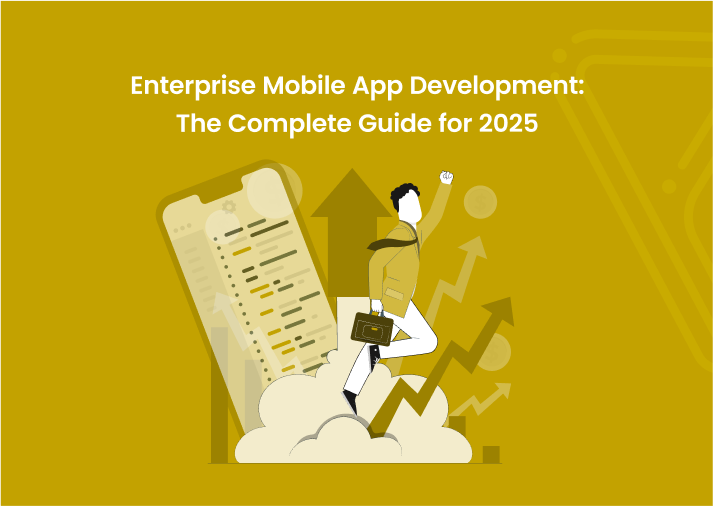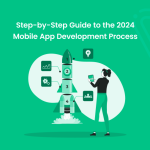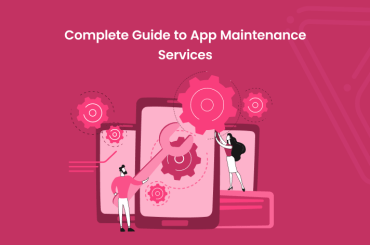Have you ever wondered how mobile apps can make your workplace more efficient? Enterprise Mobile App Development will be your answer if you are in a business that is dependent on Teams and Communication.
In this blog, we will discuss what enterprise mobile apps are and how they matter. Here you will understand their important features and the value they add. Let us go ahead and explore how some of these awesome apps can bring your business into this digital era!
What Is Enterprise Mobile App Development?
The process of developing customized mobile applications to meet certain operational requirements within an organization is known as enterprise mobile application development. Business applications are different from consumer-facing apps in that they are mainly used by internal users like employees, managers, and partners, and are often part of existing business systems.
The basic aim of the enterprise mobile app is to smoothen processes, maximize productivity & facilitate data extension. These applications range from project management tools to customer relationship management (CRM) systems and human resources (HR) solutions that allow companies to better manage their activities and keep information in one place.
Global Market for Enterprise Mobile Apps Overview
The worldwide Enterprise Mobile App Development market is booming due to digital transformation and an expanding mobile workforce. Here’s a look at the latest numbers highlighting this rapid growth.
- Market Size: The enterprise mobile app market registered $98 billion in 2023 and is anticipated to grow at an 11.8% CAGR till 2030.
- User Growth: 85% or more of the companies will have at least 1 enterprise mobile app by 2025.
- Industry Investment: IT departments spend approximately 30% of their software budgets on enterprise mobile app development.
- Mobile Workforce: 60% of the global workforce is projected to be mobile by 2024, creating the need for mobile apps.
- Regional Growth: Asia-Pacific is expected to grow at the fastest rate with a CAGR of 13% driven by technology deployment and rapid digitization.
For businesses looking to grow, working with an App Development Company in Chennai like Pyramidion will help you create the right enterprise mobile apps for your needs.
Types of Enterprise Mobile App Development
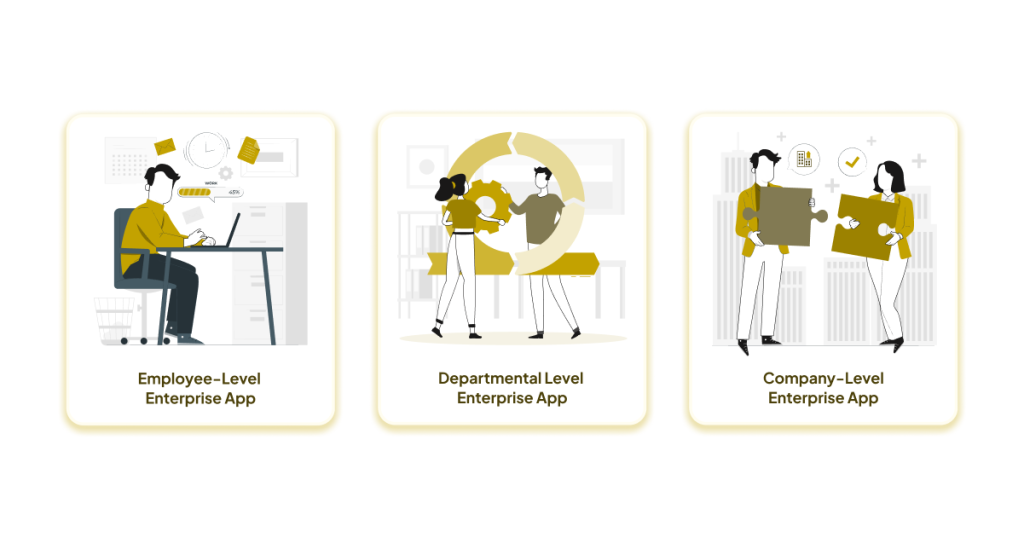
Understanding the different types of enterprise mobile apps is crucial for businesses to choose the right solution that meets their specific needs and objectives. Here are some types of these apps:
Employee-Level Enterprise App: This is an app dedicated to solving the problem for individual employees in their day-to-day work. This includes scheduling apps, communication tools, and time-tracking apps that make it easier for employees to manage their workload and time.
Departmental Level Enterprise App: These applications address the requirements of particular divisions, such human resources or sales. A sales team, for instance, could track leads with a powerful CRM app, while HR could manage employee onboarding, leave requests, and benefits with an app.
Company-Level Enterprise App: Company-wide apps serve the whole Organization. It typically includes features such as document management, employee collaboration tools, and analytics dashboards, thus promoting a single point of access for important resources and data across all departments.
Why is a Mobile Enterprise App Necessary?
In the current fast-moving environment, enterprises cannot afford to stay behind, which is why mobile enterprise apps are important for businesses today. Enterprise Mobile App Development allows easy communication, quicker decisions, and improved management of resources and tasks, all of which lead to increased productivity.
In addition, an enterprise app allows employees to access real-time data and tools that help them execute their tasks on the move. For organizations with remote teams or field-based staff, a mobile app is necessary to stay connected and keep things running.
Is investing in Enterprise Mobile App Development worth it?
Enterprise Mobile App Development may be expensive but understanding its advantages can offer the justification needed to manage the costs. Here are some important factors to consider when determining whether this investment is good for your organization:
- Resource Demanding: Enterprise Mobile App Development is indeed resource demanding, however, it is a long-time investment that pays off.
- Workflow Improvement: Enterprise app development can be tailored in a way that it improves workflows, eliminates redundancy and automates repetitive processes.
- Cost Reduction: Automation and Efficiency Enable Companies to Reduce Cost of Operations.
- Define Goals: Before starting development, you should know what your goals are, along with your budget and ROI.
- Cost Factors: Development costs will depend on the complexity of the app, the platform you choose, and the level of planning involved.
- Growth and Efficiency: Well-functioning enterprise apps would eventually generate growth and efficiency for the organization.
To ensure you get the best results, partnering with a Mobile App Development Company in Chennai can help you achieve a seamless and effective enterprise app solution.
Benefits of Enterprise Mobile Application Development
There are many benefits associated with enterprise mobile app development, such as increased productivity, collaboration, and access to critical information in real time. When a sales team can update the details of client conversations and meetings on their phones and close deals in real-time, the entire organization stands to gain.
Enterprise apps also help in nurturing transparency by creating transparency, which in turn would eventually lead to a sense of accountability among employees by giving them a clear view of the tasks progress and what timeline has been allotted to the project. This kind of visibility improves collaboration between teams, enabling smooth inter-departmental functioning and accountability in issue resolution.
Key Features of an Enterprise Mobile Application
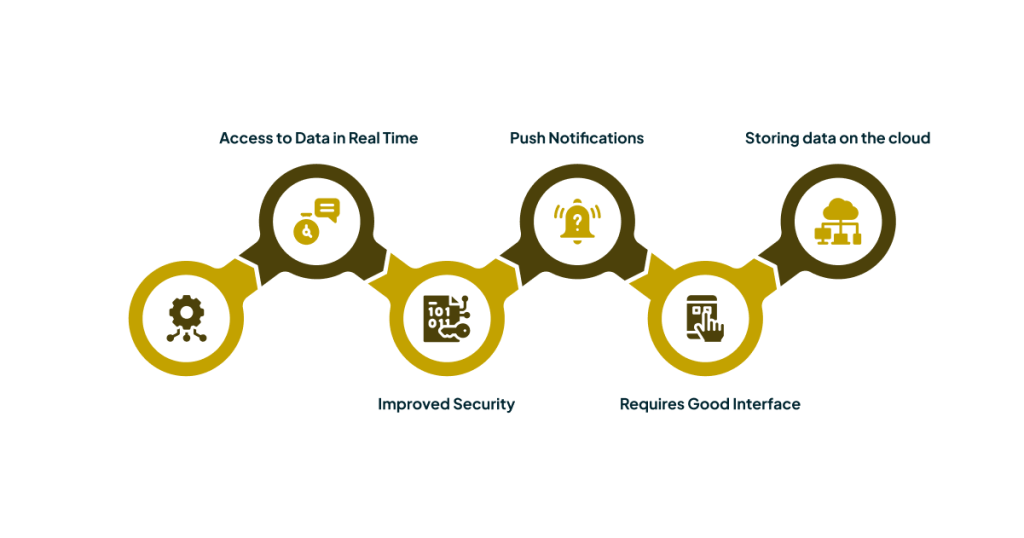
There are certain functionalities that Enterprise Mobile App Development should possess in order to meet the requirements of a business properly:
- Effortless Integration: The software can be integrated with the existing tools and systems that will allow the data to flow seamlessly across various platforms.
- Access to Data in Real Time: Immediate access to data is a part of today’s world, as it allows businesses to respond to certain events faster, and feed decisions leading to the proper actions.
- Improved Security: Enterprise data is always confidential, so features such as secure APIs, encryption, two-factor authentication, etc, are a must.
- Push Notifications: Push notifications provide employees with instant alerts that help improve engagement and response.
- Requires Good Interface: A simple and user-friendly interface is key for adoption as it ensures that the employees will be able to navigate around the app without struggle.
- Storing data on the cloud: It helps to access the data from anywhere, facilitate teamwork, and secure and backup the data as well.
Enterprise Mobile App Development Process
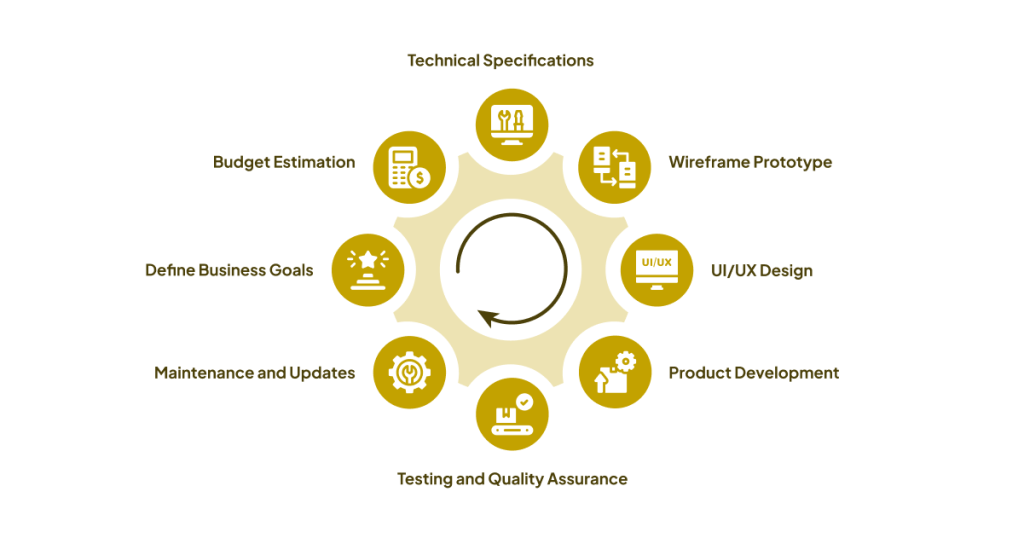
For an organization to take advantage of mobile via technology to bring efficiency and effectiveness in operations, the Enterprise Mobile App Development Process plays a key role. With a systematic approach, businesses can get their applications designed according to certain needs and provide value to the users.
It involves multiple steps, right from business objective setting to continuous maintenance and updates. All stages are necessary to develop a committed and easy-to-use mobile app for organizations that support operational success.
Well, below, we have structured this process in a tabular format for you, as it makes it easier for the users to know each step involved in the whole process of Enterprise Mobile App Development.
| Steps | Description |
|---|---|
| 1. Define Business Goals | Get goals & expected outcomes for the app in alignment with the organizational objectives. |
| 2. Budget Estimation | Calculate the budget, including development, testing, implementation and further maintenance expenses. |
| 3. Technical Specifications | Compile a comprehensive list of technical specifications for the app, such as integrations, data storage and transfer, and security protocols. |
| 4. Wireframe Prototype | A prototype is a great way to help make the app layout understandable and collect inputs before you build it. |
| 5. UI/UX Design | Develop a simple and intuitive user interface to improve usability and capture user engagement across their journey. |
| 6. Product Development | Develop the app focusing on reliability and responsiveness while adhering to coding best practices. |
| 7. Testing and Quality Assurance | Conduct thorough testing to identify bugs and ensure compatibility across devices and operating systems. |
| 8. Maintenance and Updates | Keep the app fresh by updating it regularly to meet the security defense and adapt to the changing requirements of the enterprise. |
Top Enterprise Mobile App Development Trends in 2024
To remain at the top of Enterprise Mobile App Development, it is important to understand the trends influencing the industry. By 2025, things such as integration of AI, security improvements, and low code platforms will change how companies do app development.
- Incorporating AI and Machine Learning:
With features such as predictive analytics, AI can be helpful in better decision-making and personalization in enterprise apps. - Strengthened Techniques in Data Security:
As there will be no halt in the growing cyber threats, therefore, advanced data security techniques will need to invest in enterprise applications. - Low-Code/No-Code Development Platforms:
These platforms make building apps faster and let even non-developers contribute, speeding up deployment and lowering development costs.
How enterprise mobile app development can take your business to the next level?
Enterprise mobile applications facilitate companies to automate work, minimize manual processes, and improve resource utilization. This streamlining not only reduces cost but also enhances the quality of service which maximizes customer satisfaction and reduces service time.
Enterprise Mobile App Development can act as a strong pillar for the growth and scalability of an organization by increasing productivity, reducing errors, and facilitating quick decision-making. Furthermore, such apps empower teams in being more proactive with real-time data to address and respond to changes in the market or customer needs.
What steps can be taken to secure the enterprise mobile application?
In Enterprise Mobile App Development, Security is the major concern. Implement encryption, two-factor authentication, mobile device management (MDM) solutions to secure information. Periodic security audits and vulnerability assessments will help identify and remediate possible vulnerabilities.
Also restrict user access by role to avoid data exposure; Employees should only have access to data pertaining to their functions. Using features like remote data wipe can help in securing sensitive data in case of a lost device or compromised device.
Specification of Successful and Popular Enterprise Mobile Apps in the Market
Enterprise Mobile apps have revolutionized the way businesses function by enabling collaboration, productivity, and access to remote work. Let us discuss some of the most productive enterprise applications that companies across the globe widely adopt to optimize workflow and team productivity:
- Dropbox: This application enables your employees to easily store, share, and collaborate on files; a favorite among businesses all over the globe.
- Slack: The app has changed the face of communication at the workplace and now teams can communicate in real-time, file share, and organize conversations in the app.
- Zoom: With video conferencing features to keep remote teams connected and productive, Zoom’s mobile app offers businesses all the tools they need to re-engage their teams.
- Monday.com: With customizable workflows, Monday.com allows you to bring all your project management needs together in one place. Track your tasks, assign responsibilities, and get an overview of the entire progress of projects in real-time.
Aspects to consider before enterprise mobile app development
How to prepare for Enterprise Mobile App Development? Keep these important considerations in mind before you venture out.
- Choosing a platform: Decide if the app requires iOS App Development, Android App Development, or a cross-platform solution based on user requirements and the devices commonly used at an organizational level.
- Determine App Users: Knowing the app’s main users (e.g., remote workers, field agents, or office workers) will aid in customizing the app’s features.
- Mobile Analytics: Integrate analytics to track how users are engaging with the app so that you can optimize functionality based on real user activity.
- User Interface/User Experience (UI/UX) Design: Focus on human-centered, practical, and aesthetically pleasing design.
- Security Compliance: Strong application security features are a must such as secure data storage, access controls, and consistent security audits.
Challenges of Enterprise Mobile Applications and its solution
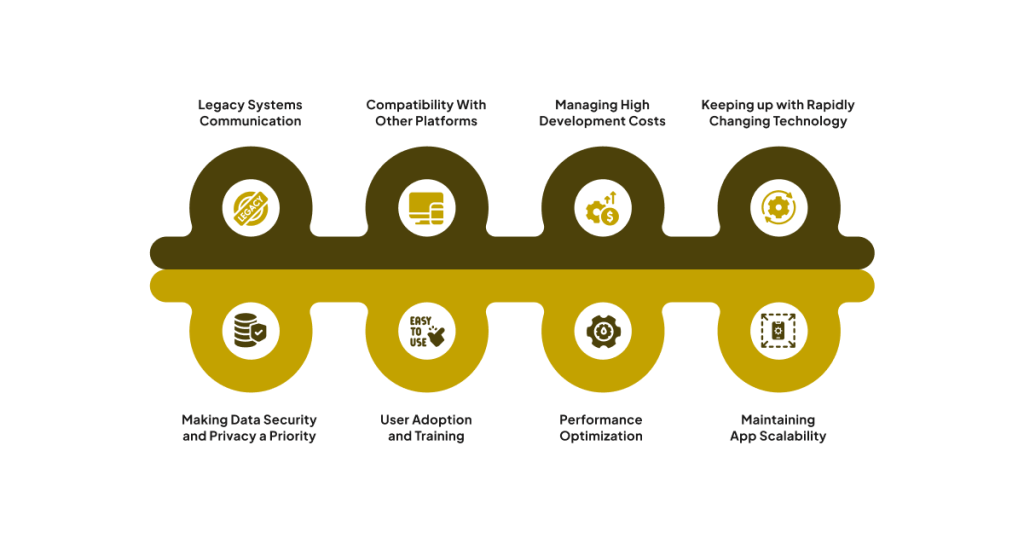
- Legacy Systems Communication: Set up middleware or application programming interfaces for seamless integration of legacy systems to the new app and to prevent data inconsistency.
- Making Data Security and Privacy a Priority: Encrypt sensitive data, use secure APIs and conduct regular security audits to ensure compliance with industry standards.
- Compatibility With Other Platforms: Develop cross-platform development tools to provide a strong user experience on all devices and operating systems.
- User Adoption and Training: Ensure your app has easy to use interfaces, and create training material to ease transition and increase chances of using the app.
- Managing High Development Costs: Set up an agile methodology and write the first version of the product with only critical features in order to reduce excessive development cost.
- Performance Optimization: Optimize code and use caching strategies to keep the app running fast and avoid lags in performance even under high usage.
- Keeping Up with Rapidly Changing Technology: Maintaining regular updates to the app and embracing agile practices will help the app stay in sync with emerging technology and user feedback.
- Maintaining App Scalability: Make sure the architecture and the cloud solutions are scalable enough so that the increased usage can always be handled and the future business needs can always be accommodated.
Costs and Duration of enterprise mobile application development
To avoid unnecessary delays and the final product not even coming close to what the organization needs, a realistic timeline and budget become even more essential in enterprise mobile app development. Pyramidion provides complete estimates for app development costs and duration along with clear and transparent value for every stage. Here are the various stages in the process:
| Process | Description | Estimated Time | Estimated Cost |
|---|---|---|---|
| Project Analysis | Collecting requirements & understanding the project needs of the client. | 8 hours | Free at Pyramidions |
| UI/UX Design | We design the app’s visual interface and plan the user experience. | 120 hours | $3,000 |
| App Development | We also develop the entire app from scratch for iOS and Android systems. | 1,300 hours | $32,500 |
| Quality Assurance | We carry out the tests for errors and ensure smooth function. | 520 hours | $5,200 |
| Project Coordination | We manage the project and ensure its timely completion. | Throughout the development cycle | $5,850 |
Why should you choose Pyramidions to build a Mobile App For your Enterprise?
With Pyramidion, you can develop a mobile app for your business with super close collaboration. We can help integrate your app with existing enterprise systems, which will be developed by our team to be secure, scalable, and provide a smooth UX.
From outline to launch, and then from launch through sustainment, we will walk you through every step of the way. That is why with our commitment to quality, you can trust us with a solution that not only is perfectly aligned with your business goals, but also will grow with your organization.

Conclusion
Are you ready to take your business to the next level with an enterprise mobile app? We’ve discussed the primary factors impacting cost and time frame, giving you some insight into the development cycle.
Enterprise mobile apps are transforming businesses by boosting efficiency and enhancing customer engagement. Among the top Mobile App Development Companies in Chennai, Pyramidion offers tailored solutions to meet your unique needs.
This blog is your guide to making informed decisions about enterprise mobile app development as you consider your options. Together with Pyramidion you can make your vision real. So, why wait? Reach Out To Us Today, and let us help you create the future of your organization!

Having almost 10 years hands-on experience in technologies like Blockchain, Quantum security, Architecting Scalable Systems, Microservices, Metaverse, Data Science and Mobile-oriented technologies, it is also my nature to infuse some fun-filled activities aiming to optimize team communication and productivity.

